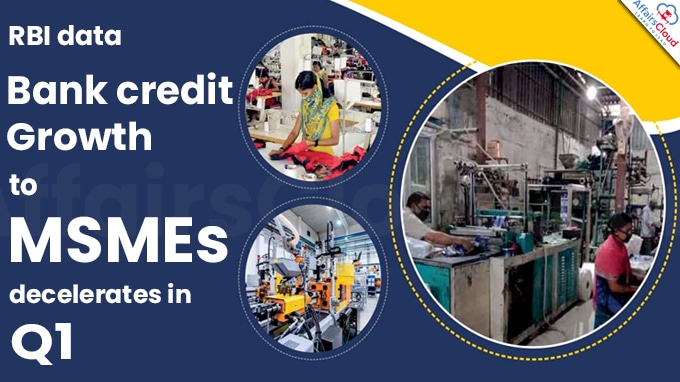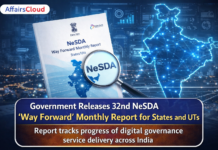 According to the Reserve Bank of India (RBI) data, Bank credit growth to Micro, Small and Medium Enterprises (MSMEs) has decelerated on a year-on-year (y-o-y) basis in the first three months (April-June) of the FY24 i.e. Q1FY24.
According to the Reserve Bank of India (RBI) data, Bank credit growth to Micro, Small and Medium Enterprises (MSMEs) has decelerated on a year-on-year (y-o-y) basis in the first three months (April-June) of the FY24 i.e. Q1FY24.
- Banks’ cautious attitude towards risk makes them hesitant to provide loans to small units, leading to a deceleration in bank credit growth.
Key Points:
i.Credit to medium industries grew by 13.2% in June (compared to 47.8% in June 2022).
ii.Micro and small industries experienced a 13% credit growth in June (compared to 29.2% in June 2022).
iii.Gross bank credit outstanding to medium industries at Q1FY24 end was Rs 2,63,440 crore (up from Rs 2,32,776 crore in June 2022).
iv.Credit outstanding for micro and small industries in June was Rs 6,25,625 crore (compared to Rs 5,53,675 crore in June 2022).
v.May 2023 saw credit growth of 18.9% for medium industries (compared to 42.9% in May 2022 ) and 9.5% for micro and small industries (versus 32.7% in May 2022).
April’s loan growth for medium industries was 19.1% (compared to 53.7% last year).
vi.Growth for micro and small industries was 9.7% in April 2023 (down from 29.8% in April 2022).
The Expert Committee on MSME, constituted by RBI in December 2018, has estimated the overall credit gap in the MSME sector to be in the range of Rs 20 to Rs 25 lakh crore.
RBI issues new guidelines for Fair Lending Practices
RBI has issued comprehensive guidelines to the Regulated Entities (REs) regarding penal charges in loan accounts to ensure fairness, transparency, and accountability in the lending practices of financial institutions. These will come into effect from January 1, 2024.
- RBI issued these instructions under sections 21, 35A and 56 of the Banking Regulation (BR) Act, 1949, sections 45JA, 45L and 45M of the RBI Act, 1934, and section 30A of the National Housing Bank (NHB) Act, 1987
Applicability of Guidelines:
These guidelines are applicable across various financial entities, including commercial banks (including Small Finance Banks, Local Area Banks, and Regional Rural Banks), Primary (Urban) Co-operative Banks, Non-Banking Financial Companies (NBFCs), and All India Financial Institutions.
- These will not apply to Credit Cards, External Commercial Borrowings, Trade Credits and Structured Obligations which are covered under product specific directions.
Motivation behind the Initiative:
This action is part of RBI’s ongoing commitment to ensuring fair treatment of borrowers and addressing customer complaints regarding the imposition of penal charges.
Key Guidelines:
i.Penalties for loan contract non-compliance termed ‘penal charges‘ not ‘penal interest.’
This means that such charges should not be incorporated into the interest rate, and no additional interest should accrue on these charges.
ii.Penalties linked to non-compliance should be fair and proportional. The charges should be clearly disclosed in loan terms and Key Fact Statement (KFS).
iii.Financial institutions need a board-approved policy for loan penalties outlining charges rationale, criteria, and their application across various loans.
iv.Individual borrower penalties (excluding business loans) must not exceed penalties for non-individuals in similar non-compliance cases.
Recent Related News:
i.The RBI Governor Shaktikanta Das launched the Reserve Bank’s next generation data warehouse, viz., the Centralised Information Management System (CIMS) during the 17th Annual Statistics Day Conference on June 30, 2023.
ii.In June 2023, RBI conducted the Rs 75,000 crore 4-day Variable Rate Repo (VRR) auction to address the expected stress on liquidity ahead of goods and service tax outflows. The RBI received bids worth Rs 75,695 crore but accepted only Rs 75,004 crore at a 6.51 percent cut-off rate.
About Reserve Bank of India (RBI):
Governor – Shaktikanta Das
Deputy Governors – Swaminathan Janakiraman, Michael Debabrata Patra, M. Rajeshwar Rao, T. Rabi Sankar
Establishment – 1st April 1935
Headquarters – Mumbai, Maharashtra




